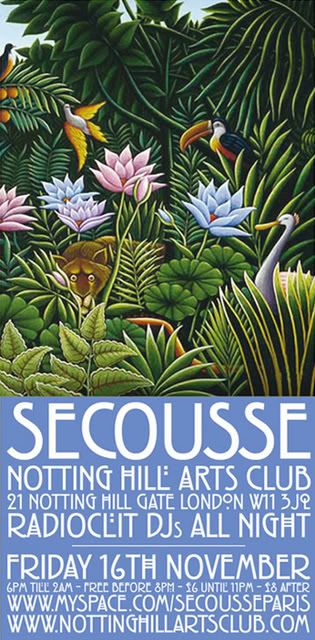Everyone reasonably immersed in American popular culture knows about
tiki. Primarily a theme for bars and restaurants with a supposedly Polynesian flavour, it was born in the thirties, blossomed immensely in the fifties and died, more or less, with the counterculture of the late sixties. Besides a style of interior decoration and a set of drink recipes, a notable aspect was
the music, with the theme being closely related to
classic 50s-style exotica.
But did you know there is a
tiki revival subculture? Starting (according to
this great article, which is one of my main sources here) with a tiki-styled
camp at the
Burning Man festival in the mid-nineties, it soon blossomed out with
zines,
clubs,
festivals,
a music scene... and it has reached Scandinavia.
My friend Simon down in Malmö showed me the shelf in his local record store where they kept tiki records, and claimed that it had grown fairly big over here in the past few years. Somehow, there's a resonance across the decades and countries, and the style that was prevalent in the United States fifty years ago has found a home in southern Sweden today.
Of course, the fifties are not the noughties. What was considered acceptable then is not necessarily so now. But while there are obviously problematic differences, there are also significant enough similarities across the ages, not just with the revival but with other contemporary music as well, not least with
global ghettotech...

There can be a very thin line indeed between subtle irony and utter seriousness, but one of the remarkable features of the tiki revival is that it
doesn't see it all as a big joke. Contrast it (and contrast they do) with what would seem a natural neighbour - lounge revival - and the whole distant camp aspect seems completely absent, a playful humour, sure, but no self-conscious sarcasm. Tiki affectionados are as likely to talk about intricate arrangements, design craftsmanship and
zones of relaxation as anything kitchy. In fact, a more natural neighbour than lounge seems to be rockabilly revival, with an equal focus on serious dressing up, forming cultural bonds and listening to a certain subset of bands.
In a lot of ways, then, the whole "revival" aspect of tiki seems wilfully perverse, since there was no subculture to begin with. Tiki, once seen as a clear precursor to architectural postmodernism in is playfulness, has been recast as an ultimate
primitivistic modernism in the footsteps of Stravinsky and Picasso. It's been imbued with earnestness and nostalgia that was never present the first time around, just like the world modern seems to have shifted firmly from an indicator of the future to a conservationist clinging to the past. The "modern primitive" theme used in some previous events
here carries a double meaning: self-chosen "primitivism" both contemporary and harking back to a bygone modern era...
This earnestness, of course, makes it all the more problematic from a historical standpoint.
Accusations of racism are obviously not new to tiki, as the interviewees in
the 1996 article indicate. One of the people involved is trying to "be sensitive" to actual Polynesian culture, but for the most part it straightforwardly passes on the mixed-up fantasy of the 50s. Again, there can be a very thin line indeed between detached academic obsessions and underhanded participation. Besides all the more obvious ideas about distortion, social orders and domination one aspects stands out for me: the depopulation. In both the old tiki world and the new, there seems to be no context to the exotic images, and the items are eerily divorced for their creators, like an old colonial fantasy in the Robinson Crusoe tradition where the colonised subjects are faded, like ghosts, into traces.
Which brings me back into global ghettotech.
Once, what seems to be an awful many years ago now, the scene was about "exploring" the self-made music of ex-colonial subjects and bringing it up to western attention, in contrast with the exoticising old world music. Then the DJ's involved starting making their own music which imitated or referenced the music they'd previously transmitted, sometimes in "collaboration" with third-world artists. At the lowest end of this there are offensive caricatures, like the ones
Rachel so eloquently criticise in this post, but even then the people involved try to put themselves on the same level as the people involved - they're (sarcastically, perhaps, I guess) trying to
be colonised subjects.
But now, it seems, the path is open for the colonised subjects to disappear completely, like they have in tiki revival. (The word "tikitech" is from a Reader comment by
Wayne.) Rather than reference some cultural manifestation from the third world, they reference a kitchy
european or american fantasy of third world culture, or often not even that, merely an empty paradise, exotica for exotica's sake. Tiki revival has its ancient, mystical statues, and global ghettotech has its safari imagery - the Lion King, Madagascar, lion costumes. Animals abound but there are absolutely no people. This, of course, happily mirrors the simultaneous decrease of third world musicians in the actual music. The issue lies deeper than just some pictures.
For me, as I stated in
my comment to Rachel's post, the self-consciously colonial imagery is a lot worse than the clumsy caricatures. As the tiki example shows, seriousness is but a small step away, and though it may be (in Rachel's words) "snarky / cheeky / hitorical / self-referencial" now it's still being
used, and somehow appreciated by the creators and listeners. To take up a recurring theme in this post again: there's a very thin line indeed between being privileged and self-referentially pretending to have a colonial mindset, and actually having one in the midst of that privilege.












































